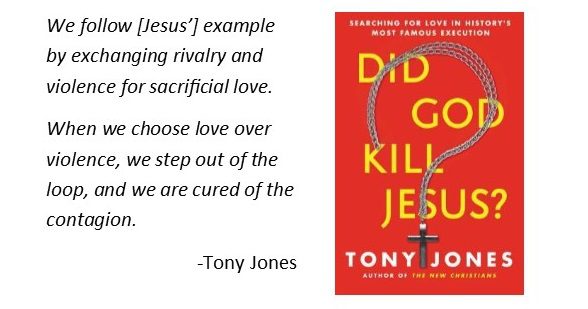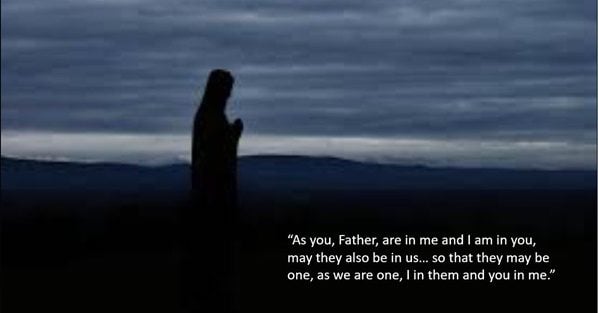 We were halfway through our youth group’s class on Holy Week. We discussed Palm Sunday as an act of political subversion and Maundy Thursday as the King becoming the Servant. We were on a roll and everyone was engaged, but he was becoming restless. I could tell it was much more than typical teenage angst. So I addressed him, “It looks like you may have something to say…” And then the question burst from his lips:
We were halfway through our youth group’s class on Holy Week. We discussed Palm Sunday as an act of political subversion and Maundy Thursday as the King becoming the Servant. We were on a roll and everyone was engaged, but he was becoming restless. I could tell it was much more than typical teenage angst. So I addressed him, “It looks like you may have something to say…” And then the question burst from his lips:
What’s so good about Good Friday?
“That’s a great question,” I responded. Remembering some teacher training tips, I put the question back to him, “What do you think is so good about Good Friday?”
Did God Kill Jesus
It’s one of the question behind Tony Jones’s latest book, Did God Kill Jesus: Searching for Love in History’s Most Famous Execution. It’s a provocative title that fits Tony’s provocative style. The book is an accessible theological tour de force that examines the different models of Atonement that try to make sense of the cross. I highly recommend this book. It’s about much more than the Atonement. It’s about the very character of God.
Tony writes that, “If Jesus tells us anything about God, it’s that God is love—not wrath or anger or vengeance, but pure love.”
And yet we claim that the death if the one who revealed that “God is love” was in some sense good. Why? Throughout Christian history, the cross was seen as a way of making Atonement with God. “Atonement means reconciliation,” Tony writes, “in this case between God and humans.” That the cross reconciles humanity with God is a belief held by most Christians. Just how that reconciliation happened is the question Tony explores in the book.
Christians have come up with many different answers. As Tony articulates, some in Christian history believe that Jesus death is good because it saved us from God. This view came later in Christianity. It wasn’t fully developed until John Calvin articulated it in the 16th century. Many theologians call it the Penal Substitutionary Atonement. Tony calls it the Payment model.
This view claims that God is holy. God’s holiness is offended at human sin, which leads to God’s wrath. Since we all sin, God is offended by all of us and because God is just, someone needs to pay for humanity’s wrathful offense to God’s holiness.
Enter Jesus. “God’s wrath was satisfied by Jesus’ substitutionary death… Core to the Payment theory of the atonement are two premises: (1) human sin is a terrible offense to God; and (2) God is governed by a sense of justice that will not allow him to overlook even one sin.”
I have always been troubled by this view of God. It never made sense to me. Fortunately, Tony gives voice to my concerns. Throughout the book, Tony argues that scripture and Jesus both reveal that God is love. Period. The relationship between God and Jesus wasn’t one of violence or wrath, but of love. So, whatever our understanding of the cross, we need a view “that doesn’t pit Jesus against God, for both scripture and experience tell us that their relationship is always one of love… Jesus’ sacrifice was made out of love, not out of obligation, and his death must free us to love in new ways.”
René Girard and the Atonement
The best answer I have seen to the violence of the cross comes from René Girard. So, I was delighted when I read in Tony’s book that, “René Girard has proposed the most profound recent addition to models of the atonement.” Tony calls Girard’s model “The Mirror Model,” but Girard calls it “Mimetic Theory.” And I must say, I love Tony’s phrase “Mirror Model.” We Girardians have been trying for years to come up with a more accessible phrase than “Mimetic Theory” and I personally think “Mirror Model” is fantastic.
So, the Mirror Model (thank you, Tony!) claims that if we attribute the violence of the cross to God, we are looking in the wrong place. The violence and wrath of the cross, Girard claims, isn’t divine. It’s human. In other words, God didn’t kill Jesus. We did.
In Tony’s words, the cross mirrors back to us our own sacrificial violence and offers an alternative. “As we see Jesus dying of the contagion of violence upon the cross, he’s saying to us, This is what your rivalry and violence have wrought. This is the outcome. Now you know, so you don’t have to do it ever again.”
This is what makes Good Friday good. It’s nothing short of the renewing of creation. In the biblical account, God created everything and called it good. And yet, we know that something went terribly bad. Desire led to rivalry, which led to violent murder within the first generation, which soon led to a flood of apocalyptic violence that threatened the world. The rapid contagion of violence is the problem that plagues the biblical story. It’s the problem that continues to plague us today.
Good Friday is good because it reveals the only alternative to the violence that threatens our world. That alternative is forgiveness.
Tony states that the cross reveals that, “If God is truly in Christ, then our rivalries, our desire for revenge, our violent system of choosing and executing scapegoats, is truly condemned.” Tony’s use of the word “condemned” is misleading. God in Christ doesn’t “truly condemn” our rivalries, revenge, violent systems, or scapegoating. Condemnation is on the same level of violence. Jesus, on the other hand, is on a completely different level than violence – the level of forgiveness.
Jesus doesn’t truly condemn our violence; he truly forgives it.
Jesus stopped the cycle of violence by praying for his enemies to be forgiven. “Father, forgive them, for they know not what they do.” On the cross, Jesus reveals that God has nothing to do with wrath. A wrathful god is a mere projection of our own wrath. The true God is the God who leads us to forgive and to love our enemies as we love ourselves. As Tony puts it,
[Jesus’] was a loving sacrificial act in that he gave up something so valuable—his life—to show us that we were caught up in a loop of never-ending violence. We follow his example by doing the same, exchanging rivalry and violence for sacrificial love. When we choose love over violence, we step out of the loop, and we are cured of the contagion.
Theology of a Teenager
So, how did the teenager in my youth group answer his own question? He said, “Good Friday is good because on the cross Jesus showed us God’s love and forgiveness.”
I couldn’t have said it any better.
For more on Tony’s book, read Deborah Arca’s interview with Tony “Did God Kill Jesus? Tony Jones on the Crucifixion, Love, and Resurrection.” You can also watch my interview with Tony here.











